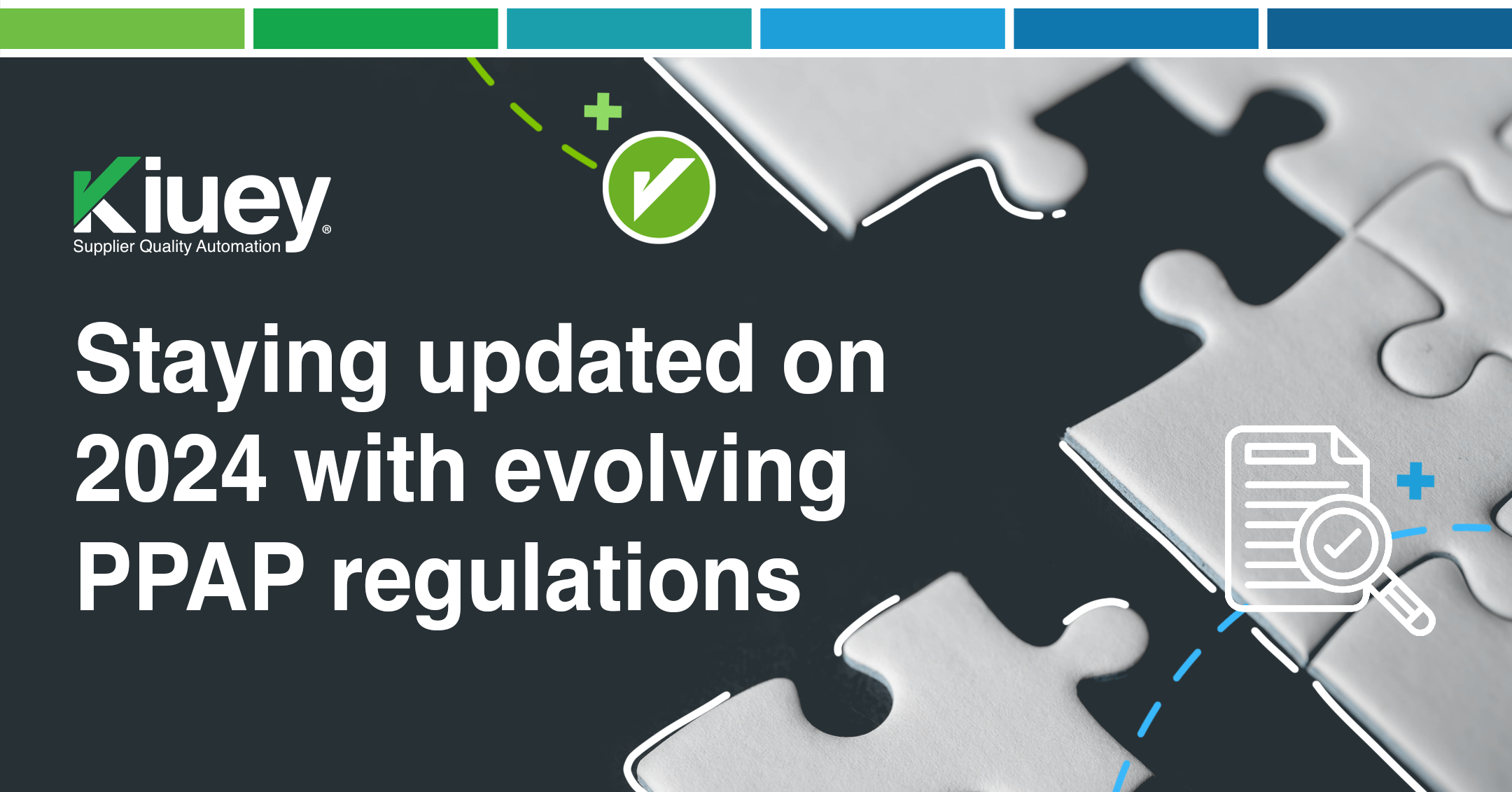
Staying updated on evolving QA & PPAP regulations
Regulatory changes are always on the scope for the manufacturing industry. While it may seem demanding to stay on the line with each necessity specified according to every particular sector, doing so leads to the path of excellence.
Given that circumstance, we enlisted major QA & PPAP regulations evolving in 2024 that you have to get to know:
Two major changes for the automotive industry manufacturing in 2024
Two important updates that OEMs should expect with this new edition are changes to the discount structure for corporate schemes and the availability of remote audits for independent remote support locations, when they are not responsible for product design.
After publication, the IAOB (International Automotive Oversight Bureau), which is an IATF oversight body that manages the IATF 16949 certification scheme, will allow a nine-month implementation period. It’s important to note that, on January 1, 2025, the previous edition of the IATF rules will become obsolete.
About the APQP Manual Update
The 3rd edition of the Advanced Product Quality Planning (APQP) was published by the AIAG (Automotive Industry Action Group) on March 1, 2024. It’s important to note that the update to the APQP manual comes sixteen years after the previous edition.
This way, APQP guidelines enable OEMs around the world and their suppliers to plan production in every detail to minimize corrections and meet customer quality requirements.
Changes in aerospace manufacturing related to QA & PPAP regulations
Aerospace manufacturing is sure a challenge. Besides the necessities and complexities of a supplier quality management scenario already present in the industry, supplier quality engineers must ensure that all the supplier quality management systems meet the requirements established by AS9100.
Published by the International Aerospace Quality Group (IAQG), AS9100 is a globally recognized quality management system (QMS) standard specifically designed for the aerospace industry, and while there are not major changes today, it’s critical to fully understand the current state of art within.
Building upon the foundation of ISO 9001, AS9100 incorporates stricter requirements and industry-specific nuances to enhance safety, reliability, and quality throughout the entire aerospace supply chain.
Key features of AS9100 include:
- Comprehensive QMS framework: Addressing critical areas like risk management, configuration control, and regulatory compliance, AS9100 ensures meticulous control over every stage of production and service delivery.
- Continuous improvement: Organizations seeking AS9100 certification must demonstrate a commitment to ongoing improvement, proactively identifying and mitigating potential risks and errors.
- Rigorous documentation and traceability: AS9100 demands detailed documentation and robust traceability systems to guarantee every component and process meets the industry’s exacting standards.
- Enhanced accountability: This standard fosters a culture of shared responsibility, ensuring all personnel understand their role in achieving exceptional quality and safety.
Complexities that arise today in electronic manufacturing
Embarking on a new or redesigned electronics project often necessitates extensive adherence to regulatory complexities. This adds crucial considerations for Original Equipment Manufacturers (OEMs) in terms of time, effort, and cost. To ensure long-term product viability and global marketability, navigating this intricate landscape seamlessly becomes imperative.
Failing to comply with regulations poses significant risks. Inspections, audits, and non-compliance fines can be substantial, potentially even crippling your business. Mitigating such risks necessitates proactive action.
Five prominent regulatory areas are heavily impacting supply chains in electronic manufacturing today:
- Restriction of Hazardous Substances (RoHS): Aiming to limit hazardous materials, RoHS sets clear thresholds for substances like mercury, lead, and cadmium. While not federally mandated in the US, adhering to it is crucial for EU market access. Your ECM should possess expertise in sourcing RoHS-compliant raw materials and assessing the cost-effectiveness of potentially creating RoHS-compliant variations for different markets.
- Registration, Evaluation, Authorization and Restriction of Chemicals (REACH): Similar to RoHS, REACH targets “substances of very high concern.” Reporting requirements kick in when such substances exceed 0.1% of product mass. Your ECM plays a vital role in ensuring banned substances remain out of your design.
- Dodd-Frank Conflict Minerals: The Dodd-Frank Act requires US public companies to demonstrate conflict-free mineral sourcing, particularly focusing on the Democratic Republic of Congo and surrounding regions. Collaborate with an ECM boasting a clear Dodd-Frank policy and utilizing reliable third-party databases like SiliconExpert to weed out non-compliant components.
- Pharmaceutical & Medical Equipment Tracking and Record Keeping: The US Food and Drug Administration (FDA) enforces regulations pertaining to raw material information, suppliers, shippers, and final product delivery. Maintaining meticulously documented records, adhering to Title 21 CFR Part 11, and understanding classification (Class I, II, or III) are crucial aspects. Partner with an ECM capable of handling record keeping or having the necessary engineering expertise to fulfill FDA requirements.
- FDA and ISO 13485 Regulations: These regulations outline stringent requirements for medical device manufacturing. Adhering to “on-label” manufacturing, proper documentation, and record retention (ideally for 10 years or even the product’s lifetime) are paramount. Seek an ECM with expertise in FDA compliance, either through outsourcing record keeping or possessing in-house engineering capabilities.
Which other QA & PPAP regulations do you consider are important to be enlisted on this article? Please share your thoughts.
Subscribe to our newsletter.
Your go-to destination for insights, best practices, and innovative solutions in supplier quality assurance.
Categories
Let's talk to see how PPAP Manager can help your company to save time and money.




